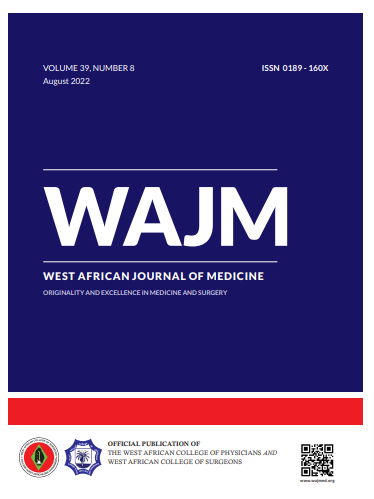REVIEW ARTICLE: Neurobiological Underpinnings in Drug Addiction
West Afr J Med . 2022 Aug 31;39(8):874-884
Keywords:
Compulsivity; Dependence; Impulsivity; Neurone; Reinforcement; Reward; ToleranceAbstract
Background: Drug addiction is a chronic biochemical drug use disorder that affects the human brain and behaviour, and leads to an uncontrollable use of a licit or illicit drug. Drug addiction can commence, usually in the young, with the use of a non-medical or a recreational drug in social gatherings, which becomes more frequent over a period of time. It is associated with incremental doses of the drug in order to achieve a state of euphoria. Addiction to drugs has been identified as a relevant social and health problem presenting a risk to public health, especially with regards to communicable diseases (e.g., HIV and AIDS, hepatitis B or C, tuberculosis, and sexually transmitted infections).
Objective: The objectives of the study were to discuss the neural mechanisms and circuitry responsible for the development and maintenance of addiction. It also examined the cycle of drug addiction and the associated encephalic regions and pathways.
Method: The search strategy used for the review employed electronic databases in the search for relevant research articles, and they included Scopus, PubMed, Science Direct, Google Scholar, Springer, and the Directory of Open Access Journals. Articles on drug addiction were identified and reviewed for selection. The keywords used in the search were: Neurobiology and [Drug Abuse], Neurobiology and [Drug Addiction], Neurobiology and [Drug Misuse], Neurobiology and [Substance Abuse], Neurobiology and [Substance Misuse], Neural Mechanisms and [Drug Abuse], Neural Mechanisms and [Drug Addiction], and Neural Mechanisms and [Drug Use Disorders]. The search was also aided by scanning the references of identified journal articles. Works identified (86 in number) were those written in English and published between 1996 and 2020.
Result: One hundred and fifty journal articles and other materials were identified. Eighty-six (86) articles and other works were extracted and reviewed after screening of the titles. abstracts and keywords, and in tandem with the selection criteria. Findings show that addiction is a complex neurobiochemical disorder that is learnt and stored in the brain as memory. The disorder alters the cyto-architecture of the brain and its functions. Relapse from drug addiction is a common occurrence. It is preventable and can be treated, although no single modality of treatment fits all forms of drug addiction.
Conclusion: Addiction to drugs is the most severe form of drug use disorder. The abuse of drugs and psychoactive substances can harm the security of all societies, including the rule-of-law. It inflicts pain and suffering to individuals and families alike, and may eventuate in deaths. Repetitive use of an addictive drug alters the way and manner the brain perceives pleasure. Drugs of abuse induce structural changes in the neurones in the brain, and in turn, alter the neurotransmitter function, and thereby, create moods and other sensations. These anatomical and physiological changes in the brain may progress even after the stoppage of drugs.
Keywords: Compulsivity; Dependence; Impulsivity; Neurone; Reinforcement; Reward; Tolerance.


